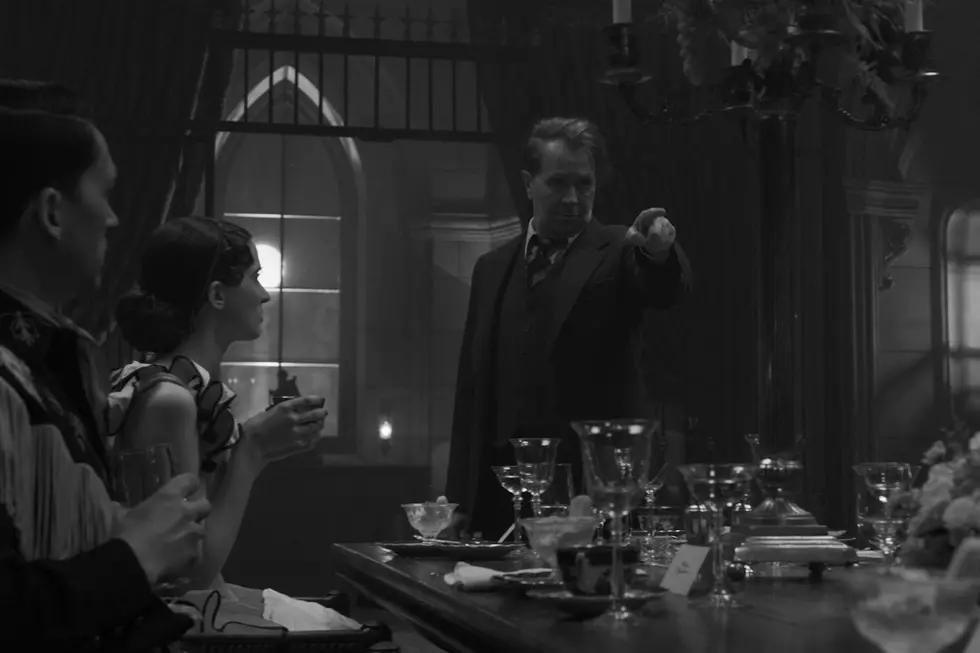
‘Mank’ Review: The Man(k) Behind ‘Citizen Kane’s Script
David Fincher has a reputation as a cold filmmaker. It’s more accurate to say he makes deeply felt movies about how the world is a cold place — at least until Mank, which seems to be missing some of that feeling. It is a beautiful film, as all Fincher films are, and it contains several compelling performances. But if all that artifice and powerhouse acting add up to something particularly profound, I did not find it during my initial viewings of the movie.
It’s not quite true to say that Mank is about the making of Citizen Kane — the movie never gets made during Mank’s 130-minute runtime. Instead, it is about screenwriter Herman J. Mankiewicz (a perpetually soused Gary Oldman) hashing out the Kane screenplay from a “dry” desert ranch in Victorville, California. Shortly before the work on the script begins, Mank is in a terrible car accident, which means he spends most of the scenes set in the present (circa 1940) laid up in bed, dictating to an assistant (Lily Collins). Borrowing a structural technique from Kane, Mankiewicz’s invention of the fictional Charles Foster Kane sparks flashbacks to Mankiewicz’s time palling around Hollywood with the character’s real-life inspiration, William Randolph Hearst (Charles Dance) and his lover, actress Marion Davies (Amanda Seyfried). The flashbacks reveal how Mank went from dazzled by Hearst’s grand lifestyle to disillusioned with it.
Donald Graham Burt’s production design brings 1930s Hollywood opulence to life, and Erik Messerschmidt’s black and white cinematography — which only occasionally mimics the high-contrast, deep-focus look of Citizen Kane — captures it in crisp detail. There are parables here, too, about the modern entertainment industry (“We’ve got to get people into theaters, but...how?” one studio executive wonders) and politics (where Upton Sinclair’s progressive run for the governorship of California is undercut by Hollywood moguls looking to protect their wealth and power). So, why does Mank feel so distant and so flat?
Maybe it’s because there simply isn’t much tension in any of it — an accusation that’s never been leveled against any previous Fincher movie except maybe The Curious Case of Benjamin Button. You have to really care about the writing process — and get very invested in watching a self-destructive alcoholic lying in bed dictating his ideas — to get drawn in to Mank’s story. Orson Welles (a credible Tom Burke), who by all accounts had a complicated relationship with Mank over the authorship of Citizen Kane and its screenplay, only shows up briefly, and rarely in a way to stoke any sort of drama about whether the Kane script will be finished or if RKO will make the picture despite intense pressure from Hearst and his Hollywood allies.
As Mankiewicz, Oldman gives a typically convincing performance, adopting a slurring speech pattern and a stumbling gait as he shuffles through Hearst’s San Simeon compound. It is a little eye-opening, though, when the obligatory title card at the end of Mank reveals that Mankiewicz died about a dozen years after the completion of Citizen Kane at the age of 55. Oldman is 62. Theoretically, Mankiewicz’s excessive drinking could have prematurely aged him but ... that’s a lot of premature aging.
Even if Oldman is a bit old (man), there are some lovely supporting turns around him. Historians who’ve insisted Citizen Kane’s Susan Alexander is a cruel and unfair fictional analog of Marion Davies will be much happier with Amanda Seyfriend’s warm, sensitive Marion. Arliss Howard is another standout as MGM head Louis B. Mayer, who dominates every scene he’s in despite his slight stature, and nails lines like “This is a business where the buyer gets nothing for his money but a memory. What he bought still belongs to the man who sold it. That is the real magic of the movies, and don’t let anybody tell you different.”
That’s a nice turn of phrase, written by Fincher’s father Jack — who penned the Mank screenplay back in the late ’90s, a few years before his death. David Fincher has waited decades to make this movie, but beyond his father’s work I struggle to find his emotional connection with the material. He’s made movies about difficult geniuses before — most notably The Social Network — but otherwise there’s very few of the hallmarks of his best work. As passion projects go, Mank is awfully cold.
RATING: 6/10
Gallery — The Strangest Netflix Thumbnails:
More From ScreenCrush









